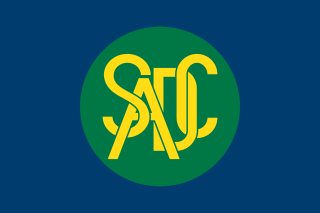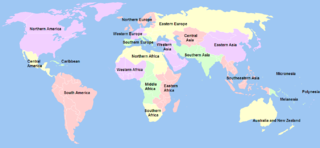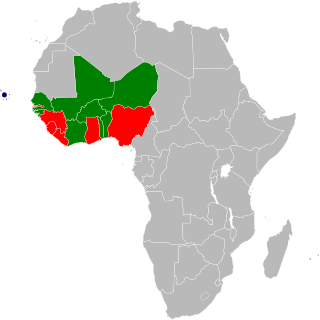
The CFA franc is the name of two currencies, the West African CFA franc, used in eight West African countries, and the Central African CFA franc, used in six Central African countries. Although separate, the two CFA franc currencies have always been at parity and are effectively interchangeable. The ISO currency codes are XAF for the Central African CFA franc and XOF for the West African CFA franc. On 22 December 2019, it was announced that the West African currency would be reformed and replaced by an independent currency to be called Eco.

A customs union is generally defined as a type of trade bloc which is composed of a free trade area with a common external tariff.

An economic and monetary union (EMU) is a type of trade bloc that features a combination of a common market, customs union, and monetary union. Established via a trade pact, an EMU constitutes the sixth of seven stages in the process of economic integration. An EMU agreement usually combines a customs union with a common market. A typical EMU establishes free trade and a common external tariff throughout its jurisdiction. It is also designed to protect freedom in the movement of goods, services, and people. This arrangement is distinct from a monetary union, which does not usually involve a common market. As with the economic and monetary union established among the 27 member states of the European Union (EU), an EMU may affect different parts of its jurisdiction in different ways. Some areas are subject to separate customs regulations from other areas subject to the EMU. These various arrangements may be established in a formal agreement, or they may exist on a de facto basis. For example, not all EU member states use the Euro established by its currency union, and not all EU member states are part of the Schengen Area. Some EU members participate in both unions, and some in neither.

The Economic Community of West African States is a regional political and economic union of fifteen countries located in West Africa. Collectively, these countries comprise an area of 5,114,162 km2 (1,974,589 sq mi), and in 2015 had an estimated population of over 349 million.

A trade agreement is a wide-ranging taxes, tariff and trade treaty that often includes investment guarantees. It exists when two or more countries agree on terms that help them trade with each other. The most common trade agreements are of the preferential and free trade types, which are concluded in order to reduce tariffs, quotas and other trade restrictions on items traded between the signatories.
A trade bloc is a type of intergovernmental agreement, often part of a regional intergovernmental organization, where barriers to trade are reduced or eliminated among the participating states.

The Southern African Development Community (SADC) is an inter-governmental organization headquartered in Gaborone, Botswana.

The special territories of the European Union are 32 territories of EU member states which, for historical, geographical, or political reasons, enjoy special status within or outside the European Union.

A subregion is a part of a larger region or continent and is usually based on location. Cardinal directions, such as south are commonly used to define a subregion.

A currency union is an intergovernmental agreement that involves two or more states sharing the same currency. These states may not necessarily have any further integration.
The Eurasian Economic Community was a regional organisation between 2000 and 2014 which aimed for the economic integration of its member states. The organisation originated from the Commonwealth of Independent States (CIS) on 29 March 1996, with the treaty on the establishment of the Eurasian Economic Community signed on 10 October 2000 in Kazakhstan's capital Astana by Presidents Alexander Lukashenko of Belarus, Nursultan Nazarbayev of Kazakhstan, Askar Akayev of Kyrgyzstan, Vladimir Putin of Russia, and Emomali Rahmon of Tajikistan. Uzbekistan joined the community on 7 October 2005, but later withdrew on 16 October 2008.

The eco is the name for the proposed common currency of the Economic Community of West African States (ECOWAS). Plans originally called for the West African Monetary Zone (WAMZ) states to introduce the currency first, which would eventually be merged with the CFA franc which is used by the French-speaking west African region within the West African Economic and Monetary Union (UEMOA). This will also enable the UEMOA states to gain complete fiscal and monetary independence from France. The UEMOA states have alternatively proposed to reform the CFA franc into the eco first, which could then be extended to all ECOWAS states.

The African Economic Community (AEC) is an organization of African Union states establishing grounds for mutual economic development among the majority of African states. The stated goals of the organization include the creation of free trade areas, customs unions, a single market, a central bank, and a common currency thus establishing an economic and monetary union.

The Economic Community of Central African States is an Economic Community of the African Union for promotion of regional economic co-operation in Central Africa. It "aims to achieve collective autonomy, raise the standard of living of its populations and maintain economic stability through harmonious cooperation".

The West African CFA franc is the currency used by eight independent states in West Africa which make up the West African Economic and Monetary Union : Benin, Burkina Faso, Côte d'Ivoire, Guinea-Bissau, Mali, Niger, Senegal and Togo. These eight countries had a combined population of 105.7 million people in 2014, and a combined GDP of US$128.6 billion.

Cape Verde is an island nation, part of the Macaronesian group of islands of the Atlantic Ocean and was a Portuguese colony during the colonial era between 1460 and 1975. EU-Cape Verde relations are founded on the EU/Cape Verde Special Partnership, agreed in 2007, building on six pillars:
The Regional Economic Communities (RECs) in Africa group together individual countries in subregions for the purposes of achieving greater economic integration. They are described as the "building blocks" of the African Union and are also central to the strategy for implementing the New Partnership for Africa's Development (NEPAD).

An economic union is a type of trade bloc which is composed of a common market with a customs union. The participant countries have both common policies on product regulation, freedom of movement of goods, services and the factors of production and a common external trade policy. When an economic union involves unifying currency it becomes an economic and monetary union.

The international status and usage of the euro has grown since its launch in 1999. When the euro formally replaced 12 currencies on 1 January 2002, it inherited their use in territories such as Montenegro and replaced minor currencies tied to the pre-euro currencies, such as in Monaco. Four small states have been given a formal right to use the euro, and to mint their own coins, but all other usage outside the eurozone has been unofficial. With or without an agreement, these countries, unlike those in the eurozone, do not participate in the European Central Bank or the Eurogroup.













